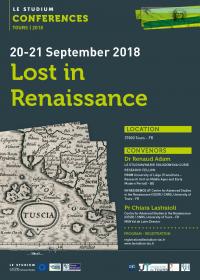[Le Studium Conferences] Lost in Renaissance
Date : Du 20/09/2018 au 21/09/2018Lieu : Villa Rabelais - 116 boulevard Béranger 37000 Tours

Convenors
- Dr Renaud Adam, LE STUDIUM / Marie Skłodowska-Curie Research Fellow – FROM University of Liège (Transitions – Research Unit on Middle Ages and Early Modern Period) – BE – IN RESIDENCE AT Centre for Advanced Studies in the Renaissance (CESR) / CNRS, University of Tours – FR
- Pr Chiara Lastraioli, Centre for Advanced Studies in the Renaissance (CESR) / CNRS, University of Tours – FR – MSH Val de Loire Director
Confirmed speakers
- Dr Renaud Adam, University of Liège – BE
- Pr Frédéric Barbier, Ecole Normale Supérieure de Paris (ENS) – FR
- Pr Marie-Luce Demonet, Centre for Advanced Studies in the Renaissance (CESR) – FR
- Dr Shanti Graheli, University of Glasgow – UK
- Pr Chiara Lastraioli, Centre for Advanced Studies in the Renaissance (CESR) – FR
- Pr Jean-Marie Le Gall, University of Paris 1 – FR
- Pr Hubert Meeus, University of Antwerp – BE
- Dr Goran Proot, University of Udine – IT
- Dr Benito Rial Costas, Complutense University of Madrid – SP
- Dr Luca Rivali, University of Milan – IT
- Pr Tania Van Hemelryck, Catholic University of Louvain – BE
- Dr Alexandre Vanautgaerden, Geneva – CH
The debate about the concept of Renaissance is certainly old, but has met for some years now a certain revival with questions relating to its temporality, particularly in France, following questions from Patrick Boucheron on the duration of a “short long medieval period” beginning in the 12th-13th centuries and ending in the 16th century. One can also point to Jacques Le Goff’s essay entitled Faut-il vraiment découper l’histoire en tranches? (Paris, Seuil, 2014) who defended the thesis that the Renaissance would not represent a particular period, but that it would be the last rebirth of a long medieval period that would end in the mid-18th century. Regardless of whether or not one adheres to this demonstration, the great medievalist nevertheless has the merit of questioning the relevance of the concept of periodization of history and, more specifically, that of the Renaissance chrononym.
With the Lost in Renaissance symposium, we would like to explore this period by reversing the paradigm that defines it. Indeed, if the scientific community agrees to characterize the Renaissance as the time of rediscovery of Antiquity, we would like to explore it through the prism of disappearance. The aim is not to draw up a list of the different points of rupture with previous times, but rather to concentrate on the losses encountered by Europe’s intellectual, literary, artistic and material heritage during the 15th-17th centuries as a result of the great religious, political, cultural and technical upheavals that affected this territory. The angle of approach chosen for this colloquium is that of the book, considered in its materiality or for its content as a witness, victim or vector of the offenses made against the heritage during the Renaissance.

